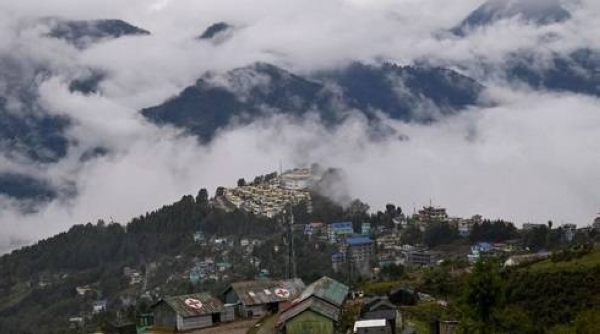
The attention of the world’s media is firmly focused on the US presidential election and the rise in coronavirus disease (COVID-19) infections in the Northern Hemisphere. There is a dearth of newspaper column inches and broadcasts dedicated to a very important geopolitical relationship: That of Russia and Turkey.
Turkish President Recep Tayyip Erdogan and Russian President Vladimir Putin managed to push the reset button on their broken relationship in the aftermath of Turkey downing a Russian Air Force jet after its incursion into Turkish airspace at the height of the Syrian civil war in 2015. In Syria, Putin backs Bashar Assad and Turkey opposes his regime. Since 2016, the two leaders have managed to keep a tenuous “friendship” going, despite being on opposite sides in a myriad of conflicts: Syria, Libya and, to a certain extent, Nagorno-Karabakh. Ankara even bought Russia’s S-400 air defense system, much to the chagrin of NATO, of which it is a member. Turkey paid dearly for this decision, both economically and in terms of technology transfer: The country’s companies were kicked out of the F-35 joint strike fighter supply chain, which is a comprehensive industrial program led by the US.
When Russian fighter jets bombed a pro-Turkish Faylaq Al-Sham training camp in Idlib this week, things unraveled. Faylaq Al-Sham is one of Erdogan’s favorite militias in Syria. It is an offshoot of the Muslim Brotherhood but was supposedly moderate enough to have been supported by the US at times. In 2018 and 2019, Faylaq Al-Sham supported various Turkish offensives against the Kurds.
This week’s Russian attack killed 80 people and injured at least 130. So, what happened?
Syria has always been difficult for both Putin and Erdogan. However, they managed to find some sort of a truce in the northwest after Turkey used heavy artillery against Assad’s quickly advancing troops earlier this year. And Putin showed restraint when Erdogan sent anywhere between 5,000 and 16,000 Syrian mercenaries to Libya to fight on the side of the UN-supported government in Tripoli against eastern strongman Field Marshal Khalifa Haftar, who is backed by Russia.
But it may have become too much for the Kremlin when Erdogan unreservedly supported Azeri President Ilham Aliyev in the conflict that erupted between Azerbaijan and Armenia over Nagorno-Karabakh. Nothing is straightforward about that conflict. The oblast of Nagorno-Karabakh was allocated to Azerbaijan when the Soviet Union dissolved. However, the majority of the region’s population is Armenian. Since 1994, there have been several armed conflicts between Azerbaijan and Armenia and as many cease-fires, with Russia often acting as a mediator. Russia has a defense pact with Armenia, but this does not, however, extend to Nagorno-Karabakh. The Kremlin happily sells arms to both sides.
It must have irritated Putin when Erdogan tried to muscle himself to the front and center of the peace negotiations over the conflict because they have historically been led by Russia, the US, France and the Organization for Security and Cooperation in Europe’s Minsk Group.
How Russia and Turkey get along has ramifications for the Middle East and North Africa region as a whole, precisely because they stand on the opposite sides of so many conflicts and because they are near neighbors in one of the world’s most geopolitically strategic regions, which is important for energy supplies to Europe from Russia, the Caucasus and further east.
Idlib is also important to Europe because Turkey can ill accommodate further flows of refugees from Syria. The country already houses between 3 and 4 million Syrian refugees. If the situation gets out of hand, the result may be Syrians heading north in their hundreds of thousands, if not millions. Turkey’s economy is on the skids. The fall of the lira seems unstoppable, which has the potential to raise inflation to dangerous levels.
This is where Europe comes in: It has an agreement with Ankara to seal its borders to refugees in exchange for €6 billion ($7 billion). That is only one side of the coin though. The other side is that relations between the EU and Turkey could hardly be worse. Europe objects to Turkish ships undertaking seismic tests to search for gas fields in what they consider to be Cypriot and Greek waters. Erdogan’s strong rhetoric against French President Emmanuel Macron in the aftermath of the assassination of a French schoolteacher by a Chechen extremist has also not gone down well in Europe. The EU’s patience with
On the one hand Erdogan is facing off against Russia on Syria, Libya and the Caucasus, while on the other he is locked in deep controversy with Europe.
Cornelia Meyer
Erdogan is stretched to say the least. The EU is also a neighbor of Turkey, while many of its member countries — including Greece — are part of the NATO alliance alongside Turkey.
In other words, on the one hand Erdogan is facing off against Russia on Syria, Libya and the Caucasus, while on the other he is locked in deep controversy with Europe. Meanwhile, his economy and currency face a nearly insurmountable challenge. Overlay COVID-19 and you have a truly toxic mix.
Turkey and Russia are important regional powers. How they get along has an influence on both the various conflicts in the Middle East and the eastern flank of NATO as well as on the EU. There are enough conflicts in this world without having bilateral disputes pouring oil on to the flames of geopolitical firestorms.
It will be interesting to see how the outcome of the US presidential election impacts the bilateral discourse between Moscow and Ankara.
Cornelia Meyer is a Ph.D.-level economist with 30 years of experience in investment banking and industry. She is chairperson and CEO of business consultancy Meyer Resources. Twitter: @MeyerResources
Disclaimer: Views expressed by writers in this section are their own and do not necessarily reflect Arab News" point-of-view










